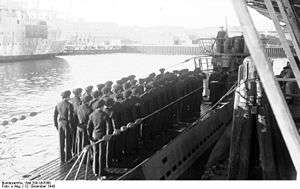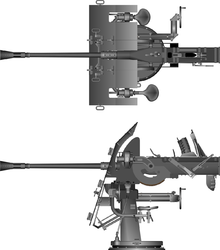German submarine U-250
German submarine U-250 was a Type VIIC U-boat of Nazi Germany's navy (Kriegsmarine) during World War II. The submarine was laid down on 9 January 1943 at the Friedrich Krupp Germaniawerft yard at Kiel as yard number 684. She was launched on 11 November 1943 and commissioned on 12 December under the command of Kapitänleutnant Werner-Karl Schmidt.[2]
 U-250 being commissioned, 12 December 1943 | |
| History | |
|---|---|
| Name: | U-250 |
| Ordered: | 5 June 1941 |
| Builder: | Germaniawerft, Kiel |
| Yard number: | 684 |
| Laid down: | 9 January 1943 |
| Launched: | 11 November 1943 |
| Commissioned: | 12 December 1943 |
| Fate: | Sunk in July 1944 in the Gulf of Finland, raised by the Soviets[1] |
| General characteristics | |
| Class and type: | Type VIIC submarine |
| Displacement: |
|
| Length: |
|
| Beam: |
|
| Height: | 9.60 m (31 ft 6 in) |
| Draught: | 4.74 m (15 ft 7 in) |
| Installed power: |
|
| Propulsion: |
|
| Speed: |
|
| Range: | |
| Test depth: |
|
| Complement: | 4 officers, 40–56 enlisted |
| Armament: |
|
| Service record[2] | |
| Part of: |
|
| Identification codes: | M 54 401 |
| Commanders: |
|
| Operations: | One patrol: 26–30 July 1944 |
| Victories: | One |
In one patrol, she sank one ship.
The boat was sunk by the Soviet submarine chaser MO103 in the Gulf of Finland (Baltic) in July 1944.
Design
German Type VIIC submarines were preceded by the shorter Type VIIB submarines. U-250 had a displacement of 769 tonnes (757 long tons) when at the surface and 871 tonnes (857 long tons) while submerged.[3] She had a total length of 67.10 m (220 ft 2 in), a pressure hull length of 50.50 m (165 ft 8 in), a beam of 6.20 m (20 ft 4 in), a height of 9.60 m (31 ft 6 in), and a draught of 4.74 m (15 ft 7 in). The submarine was powered by two Germaniawerft F46 four-stroke, six-cylinder supercharged diesel engines producing a total of 2,800 to 3,200 metric horsepower (2,060 to 2,350 kW; 2,760 to 3,160 shp) for use while surfaced, two AEG GU 460/8–27 double-acting electric motors producing a total of 750 metric horsepower (550 kW; 740 shp) for use while submerged. She had two shafts and two 1.23 m (4 ft) propellers. The boat was capable of operating at depths of up to 230 metres (750 ft).[3]
The submarine had a maximum surface speed of 17.7 knots (32.8 km/h; 20.4 mph) and a maximum submerged speed of 7.6 knots (14.1 km/h; 8.7 mph).[3] When submerged, the boat could operate for 80 nautical miles (150 km; 92 mi) at 4 knots (7.4 km/h; 4.6 mph); when surfaced, she could travel 8,500 nautical miles (15,700 km; 9,800 mi) at 10 knots (19 km/h; 12 mph). U-250 was fitted with five 53.3 cm (21 in) torpedo tubes (four fitted at the bow and one at the stern), fourteen torpedoes, one 8.8 cm (3.46 in) SK C/35 naval gun, (220 rounds), one 3.7 cm (1.5 in) Flak M42 and two twin 2 cm (0.79 in) C/30 anti-aircraft guns. The boat had a complement of between forty-four and sixty.[3]
Service history
After training with the 5th U-boat Flotilla at Kiel, U-249 transferred to the 8th flotilla on 1 July 1944.
Patrol, loss and capture
The boat's first and only patrol was preceded by a pair of short trips between Kiel in Germany, and Reval (now Tallinn in Estonia), and Zoppot (now Sopot, Poland). U-250's first sortie proper started with her departure from Zoppot on 26 July 1944. She sank the Soviet submarine chaser or patrol boat M-105 on 26 July.
This sinking resulted in a concerted response on the part of the Soviets. M-103 made the kill; dropping a pattern of depth charges which opened a large hole in the U-boat's pressure hull. Only six men escaped the submarine, forty-six others did not; the U-boat sank in the relatively shallow depth of 27 m (89 ft). It was decided to raise U-250, despite her proximity to the German-held shore. Harassing artillery fire was met with a constant smokescreen while divers worked. The Soviets succeeded in raising the boat and taking her to Kronstadt in September 1944 where she was examined.[1] She then served briefly in the Soviet navy as the TS-14 before being broken up.[2]
Summary of raiding history
| Date | Ship Name | Nationality | Tonnage[Note 1] | Fate[4] |
|---|---|---|---|---|
| 30 July 1944 | MO-105 | 56 | Sunk |
Armament
FLAK weaponry
U-250 was mounted with a single 3.7 cm Flakzwilling M43U gun on the LM 42U mount. The LM 42U mount was the most common mount used with the 3.7 cm Flak M42U. The 3.7 cm Flak M42U was the marine version of the 3.7 cm Flak used by the Kriegsmarine on Type VII and Type IX U-boats. U-250 was mounted with two 2cm Flak C38 in a M 43U Zwilling mount with short folding shield on the upper Wintergarten.[5] The M 43U mount was used on a number of U-boats (U-190, U-249, U-278, U-337, U-475, U-853, U-1058, U-1109, U-1023, U-1105, U-1165 and U-1306).
 A single 3.7 cm Flak M42U gun on the LM 42U mount.
A single 3.7 cm Flak M42U gun on the LM 42U mount. 2 cm Flak C38 in a M 43U Zwilling mount with short folding shield.
2 cm Flak C38 in a M 43U Zwilling mount with short folding shield.
References
Notes
- Merchant ship tonnages are in gross register tons. Military vessels are listed by tons displacement.
Citations
- Kemp 1999, pp. 206-7.
- Helgason, Guðmundur. "The Type VIIC boat U-250". German U-boats of WWII - uboat.net. Retrieved 30 July 2012.
- Gröner 1991, pp. 43-46.
- Helgason, Guðmundur. "Ships hit by U-250". German U-boats of WWII - uboat.net. Retrieved 26 December 2014.
- Base on war-time photographs.
Bibliography
- Busch, Rainer; Röll, Hans-Joachim (1999). German U-boat commanders of World War II : a biographical dictionary. Translated by Brooks, Geoffrey. London, Annapolis, Md: Greenhill Books, Naval Institute Press. ISBN 1-55750-186-6.CS1 maint: ref=harv (link)
- Busch, Rainer; Röll, Hans-Joachim (1999). Deutsche U-Boot-Verluste von September 1939 bis Mai 1945 [German U-boat losses from September 1939 to May 1945]. Der U-Boot-Krieg (in German). IV. Hamburg, Berlin, Bonn: Mittler. ISBN 3-8132-0514-2.CS1 maint: ref=harv (link)
- Gröner, Erich; Jung, Dieter; Maass, Martin (1991). U-boats and Mine Warfare Vessels. German Warships 1815–1945. 2. Translated by Thomas, Keith; Magowan, Rachel. London: Conway Maritime Press. ISBN 0-85177-593-4.
- Kemp, Paul (1999). U-Boats Destroyed - German Submarine Losses in the World Wars. London: Arms & Armour. ISBN 1-85409-515-3.CS1 maint: ref=harv (link)
External links
- Helgason, Guðmundur. "The Type VIIC boat U-250". German U-boats of WWII - uboat.net. Retrieved 26 December 2014.
- Hofmann, Markus. "U 250". Deutsche U-Boote 1935-1945 - u-boot-archiv.de (in German). Retrieved 26 December 2014.